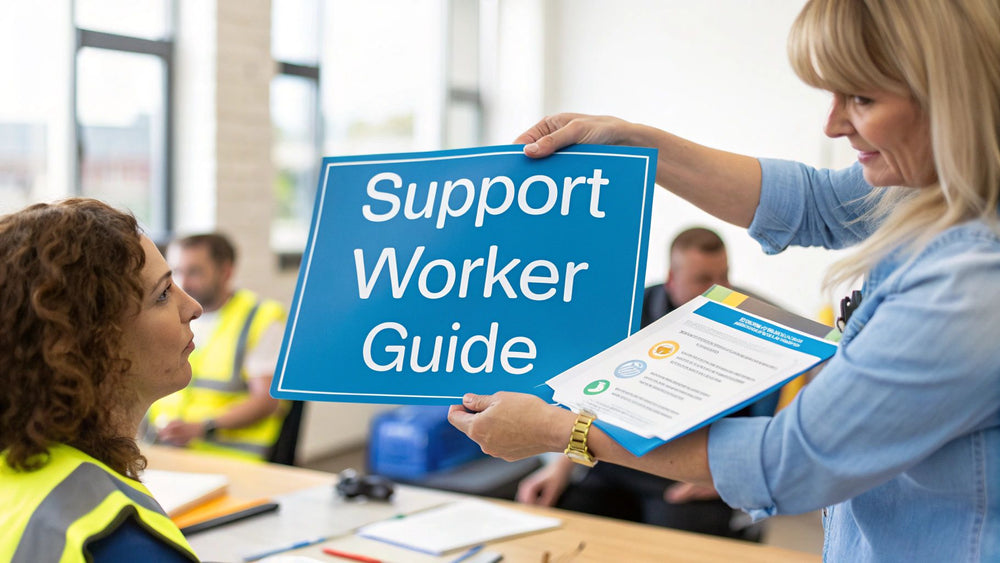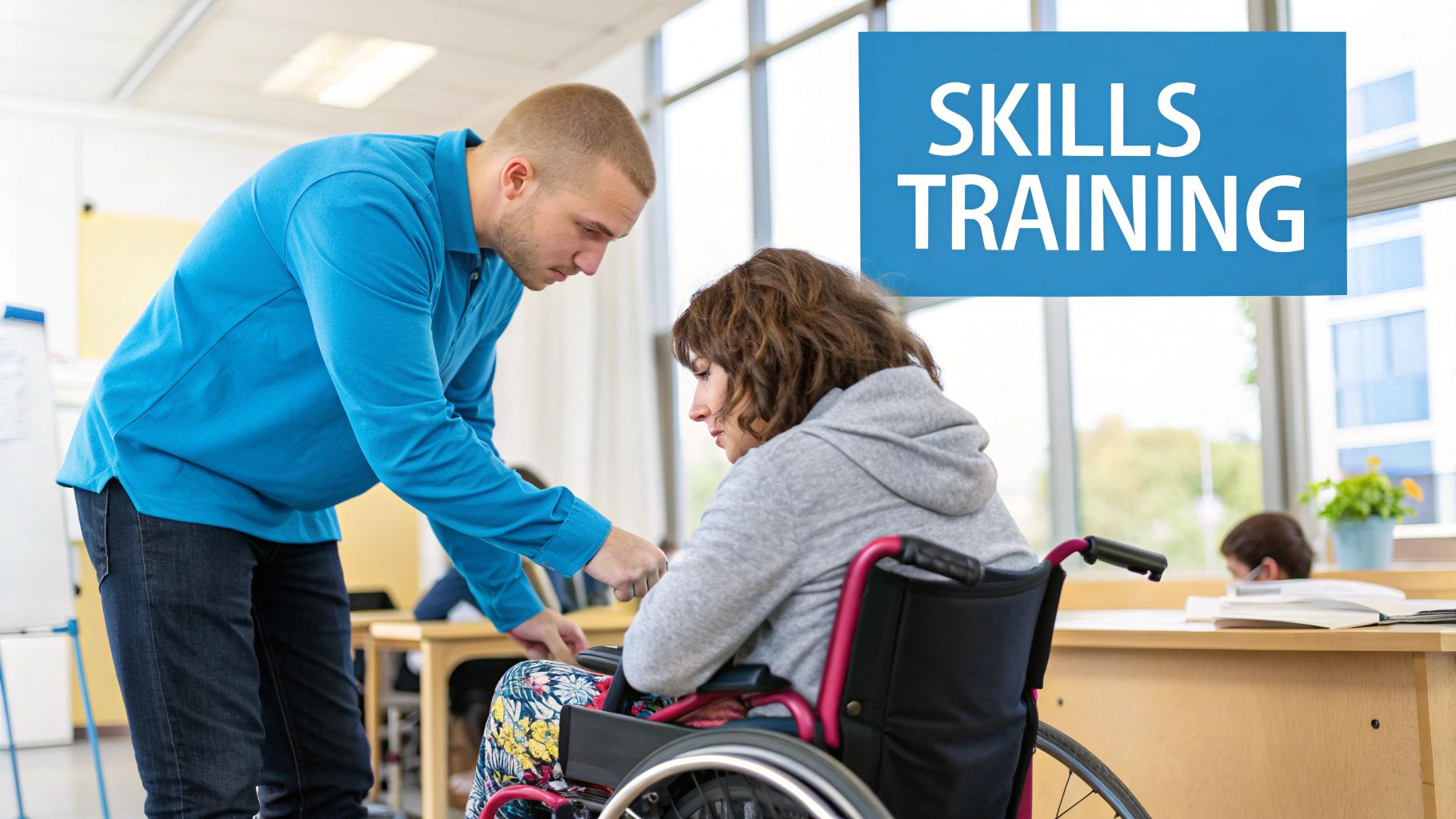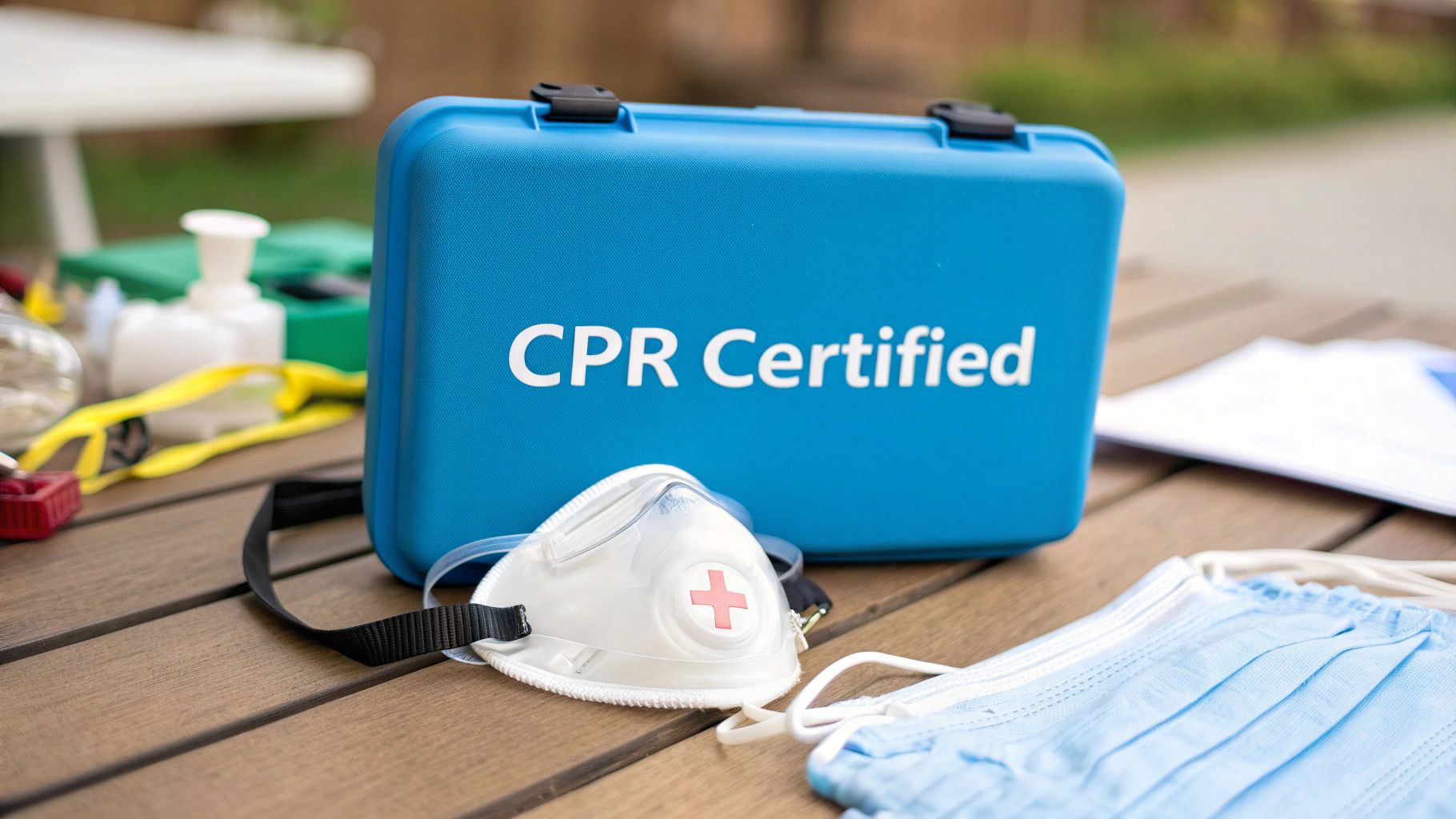Disability Support Worker Qualifications SA Guide

While you might technically be able to find some entry-level disability support roles without a formal degree, the reality on the ground in South Australia is pretty clear. The vast majority of employers see the Certificate III in Individual Support (Disability) as the baseline—the essential ticket to getting hired and building a real career in this field.
What Qualifications Do You Really Need?
Trying to figure out what you need to become a disability support worker can feel a bit like putting a puzzle together. You've got the core pieces, which are your formal qualifications, and then the crucial border pieces, like mandatory checks and your own personal skills. Let's break down what's absolutely essential versus what's highly recommended for anyone serious about working in South Australia.
Think of it like this: your qualifications and mandatory checks are your driver's licence and a registered, roadworthy car. You simply can't get on the road safely or legally without them. Your personal skills, on the other hand, are how well you actually drive—how you navigate busy streets, anticipate risks, and make sure your passenger feels safe and comfortable. You need both to be successful.
The Non-Negotiables vs. The Standouts
To make it even clearer, some requirements are non-negotiable. They are your entry pass. Other qualifications, while not strictly mandatory everywhere, are what make your application jump to the top of the pile for the best providers. Every registered provider has to follow strict rules to guarantee safety and quality, which you can read more about in the official disability service standards.
A qualification isn't just a piece of paper; it's a foundation of trust. It shows employers and, more importantly, NDIS participants that you have the knowledge to provide support that is safe, respectful, and genuinely effective.
The need for skilled support workers is huge. A mid-2024 analysis showed around 6,861 disability support worker jobs advertised across Australia, making it one of the country's biggest employment sectors. For most of these roles, the Certificate III in Individual Support (Disability) is the key that unlocks the door.
In fact, a 2023 report from Jobs and Skills Australia found that completing this specific certificate boosts your chances of getting a job by 34.51%. That's the highest success rate of any vocational course in the entire country.
Here is a simple table that separates the "must-haves" from the "should-haves" for a career in SA.
Essential vs Recommended Requirements for SA Support Workers
This table breaks down what you absolutely need to have before you start, versus the qualifications that will set you apart and open up more opportunities.
| Requirement Type | Description | Status |
|---|---|---|
| NDIS Worker Screening Check | A national, mandatory background check for anyone who works with NDIS participants in any capacity. | Essential |
| Certificate III in Individual Support (Disability) | The industry-standard qualification that gives you the foundational skills and knowledge for the role. | Highly Recommended |
| First Aid & CPR Certificates | Proof that you have the training to respond confidently and correctly in a medical emergency. | Essential |
| Working with Children Check (WWCC) | A separate, mandatory clearance you'll need if your role involves supporting anyone under 18. | Essential (for relevant roles) |
| Valid Driver's Licence | Often needed for helping participants get out into the community, attend appointments, or run errands. | Highly Recommended |
As you can see, the essential checks are all about safety and compliance. But if you're looking to build a long-term, successful career, the Certificate III and a driver's licence are what will truly give you the competitive edge.
Choosing Your Formal Training Pathway
Diving into the world of formal qualifications can feel a bit overwhelming, but getting this part right is your first major step toward a rewarding career. Think of it like building a house – you can't put up the walls until you've laid a solid foundation. For anyone looking to become a disability support worker in South Australia, that foundation is the Certificate III.
The most common and widely respected starting point is the Certificate III in Individual Support (Disability). This course is all about giving you the practical, hands-on skills you'll use every single day. It goes far beyond just theory, focusing on person-centred care, how to provide personal support with dignity, and the essential safety protocols that keep both you and the NDIS participants you work with safe.
Finishing this certificate proves to providers that you're serious about the profession and have grasped the core duties of working within the NDIS framework. You can see how these qualifications play a direct role in finding work in our guide to NDIS employment support.
This snapshot highlights the key qualifications you'll need to get started.

As you can see, a formal qualification isn't just a piece of paper; it’s a non-negotiable part of becoming a professional in this sector.
Advancing Your Skills With a Certificate IV
If the Certificate III is the foundation, then think of the Certificate IV in Disability as adding the second storey to your career. This qualification is designed for support workers who have their sights set on leadership, specialised roles, or managing more complex support situations. It's the natural next step if you're aiming to become a team leader, a service coordinator, or want to work with participants who have high-level support needs.
The Certificate IV doesn't just re-teach the basics. It builds directly on your existing skills and adds new, more advanced capabilities to your toolkit:
- Deeper Empowerment: You’ll learn advanced strategies to help participants engage with their community and build meaningful social connections.
- Complex Care: It prepares you to handle behaviours of concern and deliver highly individualised support for clients with complex needs.
- Leadership Skills: The curriculum often includes units on supervising other support workers and coordinating the delivery of services.
To help you decide which path is right for you, here’s a quick comparison of the two main qualifications.
Comparing Certificate III vs Certificate IV in Disability
| Feature | Certificate III in Individual Support (Disability) | Certificate IV in Disability |
|---|---|---|
| Focus | Foundational, hands-on skills for direct, entry-level support. | Advanced skills for complex needs, leadership, and service coordination. |
| Typical Roles | Disability Support Worker, Personal Care Assistant, In-Home Support Worker. | Senior Support Worker, Team Leader, Case Coordinator, Developmental Educator. |
| Career Progression | The essential starting point for a career in the disability sector. | A stepping stone to management, specialisation, and higher-level roles. |
This structured pathway is recognised nationally. Australia's official job classification system, managed by the Australian Bureau of Statistics, clearly states that a Certificate III is the standard for most support worker roles. For more advanced positions involving greater responsibility, a Certificate IV is often the benchmark.
So, what's the bottom line? Your choice really boils down to where you are in your career journey. If you're just starting out, the Certificate III is the perfect launchpad, giving you all the essential qualifications to land a fantastic and fulfilling job. But if you're an experienced worker ready for the next challenge, the Certificate IV provides a clear and valuable route to greater influence and impact.
The Non-Negotiable Checks for Every Support Worker

While your formal training gives you the "how-to" of disability support, a series of mandatory checks are what give you the "permission to" actually do the work. Think of them as your official, non-negotiable ticket to practice. They are an absolutely critical part of the framework here in South Australia, put in place for one simple reason: to safeguard NDIS participants.
Let's be clear: without these clearances, you simply cannot be employed by a registered provider. This section will break down exactly what you need, so you can get your paperwork sorted and become job-ready as quickly as possible. These checks ensure that every single person working in the sector meets a consistent, national standard of safety and integrity.
The NDIS Worker Screening Check
First up, and arguably the most important, is the NDIS Worker Screening Check. This is a comprehensive national assessment that digs deep to determine if a person poses any unacceptable risk to NDIS participants. It's much more than a standard police check; it reviews your police records and other relevant history to make a specific safety assessment for working in the disability sector.
In South Australia, this check isn't just a suggestion—it's mandatory for anyone in a risk-assessed role with a registered NDIS provider. It’s the very foundation of trust between you, your employer, and the people you'll be supporting.
You can apply for your NDIS Worker Screening Check online through the Department of Human Services (DHS) Screening Unit. The process itself is quite straightforward, but it's a good idea to start early. These things can sometimes take a few weeks to process, so don't leave it to the last minute.
First Aid and Driver’s Licence
Beyond the background screening, there are some practical skills that are just as essential. Almost every employer will require you to hold current First Aid and CPR certificates. Frankly, these are some of the most important qualifications you can have, giving you the skills and confidence to respond effectively if a medical emergency ever happens on your watch.
The two key certificates you'll need to get are:
- HLTAID011 Provide First Aid: This is the standard workplace first aid certificate everyone should have.
- HLTAID009 Provide Cardiopulmonary Resuscitation (CPR): This component needs an annual refresher to stay current.
On top of that, while it’s not always a strict requirement, holding a valid South Australian driver's licence and having access to a reliable vehicle will make you a much, much stronger candidate. So many support worker roles involve helping participants get out into the community, whether it's for appointments, social outings, or assisting with tasks in settings like supported independent living.
A solid grasp of workplace safety is also vital. Following critical health and safety compliance tips is a must for both workers and providers to ensure everyone’s well-being. Finally, remember that if your role involves working with anyone under 18, you will also need a Working with Children Check (WWCC). This is a separate, but equally important, clearance.
The Human Skills That Define a Great Support Worker

While formal qualifications will get your foot in the door, it’s your personal attributes—your human skills—that will truly define your success as a support worker. No certificate can teach genuine empathy or unwavering patience. These qualities are the absolute heart of exceptional support work.
Think of it this way: your formal training is the recipe, but your personality is the chef. A recipe can outline all the right steps, but it’s the chef’s care, intuition, and passion that turn simple ingredients into something memorable. In disability support, you are that chef, turning everyday assistance into real opportunities for connection and growth.
This is a role where who you are matters just as much as what you know. It takes a unique blend of compassion, resilience, and sheer practicality to really thrive.
Core Attributes of an Outstanding Support Worker
Some personal skills are simply non-negotiable for building trust and providing support that actually works. These aren’t just "nice-to-haves"; they are the very bedrock of person-centred care. Can you truly listen more than you speak? Can you find a creative solution when a well-laid plan goes sideways?
These essential skills include:
- Empathy and Compassion: The ability to genuinely understand and share another person's feelings, offering support without judgement.
- Patience and Resilience: Having the strength to stay calm and supportive through challenging moments and the ability to bounce back from tough days.
- Active Listening: This means truly hearing what a participant is saying (and what they're not saying) to fully grasp their needs, goals, and preferences.
- Creative Problem-Solving: That knack for thinking on your feet when unexpected situations pop up, finding safe and effective solutions on the fly.
A great support worker doesn't just perform tasks; they build relationships. They see the person first, not just their disability, and they champion their independence and choices at every single turn.
How you handle these human elements directly impacts a participant's well-being. For instance, knowing how to communicate effectively is a vital part of providing good NDIS mental health support, where building rapport is absolutely key to making progress.
Ultimately, these soft skills are what allow you to turn your formal qualifications into real-world impact. They’re what make participants feel safe, respected, and genuinely supported, transforming your job from a series of tasks into a truly fulfilling and meaningful career.
Working Within the NDIS Framework
Stepping into the role of a disability support worker means you're not just getting a job; you're becoming a vital part of the National Disability Insurance Scheme (NDIS). It’s easy to think of the NDIS as just a system of funding and rules, but it’s so much more. At its heart, it’s a complete shift in philosophy, built around giving people with disabilities real choice and genuine control over their own lives.
Your disability support worker qualifications will give you the practical skills for the job, but understanding the NDIS framework is what gives those skills meaning. It’s the bridge between your daily tasks—like helping with personal care or supporting someone at a community event—and the bigger goal of empowering people. You’re not just a helper; you’re a professional partner in achieving their goals.
It's All About NDIS Principles
The NDIS was created to leave the old, one-size-fits-all model of care behind. Instead, everything revolves around the individual. This means your work isn't just about following a task list; it’s about bringing a set of core principles to life every single day.
Think of these principles as your compass:
- Choice and Control: This is the big one. It’s about ensuring participants are in the driver's seat of their own lives, making their own decisions about everything from their daily schedule to their long-term dreams.
- Person-Centred Support: Your support should never be generic. It must be tailored to fit the specific needs, goals, and personality of the person you’re working with.
- Dignity of Risk: This means respecting a person’s right to make choices that involve a reasonable level of risk. It’s fundamental for learning, growing, and experiencing life to the fullest.
- Community Inclusion: A key part of your role is to be a bridge, not a barrier. You'll actively support participants in building connections, joining groups, and being a valued part of their local community.
The NDIS Code of Conduct isn't just a list of rules to avoid breaking. It's a positive guide that shows you how to deliver support with respect, honesty, and skill, ensuring the safety and well-being of every person you work with.
Putting the NDIS Code of Conduct into Practice
The Code of Conduct is your day-to-day guide to working ethically and professionally. It sets a clear standard for every single NDIS provider and worker across Australia, and that includes us right here in South Australia. It’s less of a stuffy legal document and more of a professional promise you make to the people you support.
In practice, it means you act with integrity, treat people with the courtesy and respect they deserve, and fiercely protect their privacy. It also means you’re committed to providing high-quality support and are ready to listen and respond properly to any concerns. By making this Code a natural part of your work, you build the trust that is the absolute bedrock of any successful support relationship.
Charting Your Course in Disability Support
So, you've seen what it takes to get started. Let's pull it all together and map out a clear path forward. This isn't just about finding a job; it's about building a meaningful career where you can truly impact people's lives. It all begins with a few practical first steps.
Think of this as your immediate to-do list. The focus is on getting the essentials ticked off so you can confidently apply for roles. This means looking into and enrolling in a Certificate III in Individual Support (Disability), booking your First Aid and CPR courses, and getting your NDIS Worker Screening Check application underway. With these foundations in place, you become a compelling, job-ready candidate.
Building Your Career Beyond the Basics
Your Certificate III is the perfect starting point, but it's really just the beginning. Think of it as your passport into the industry. The disability sector is full of incredible opportunities for growth if you're keen to keep learning.
Once you have some real-world experience under your belt, you might consider a Certificate IV in Disability. This qualification can open up doors to more senior positions, like leading a team or taking on specialised support roles that require a higher level of skill and responsibility.
Your hands-on experience and qualifications can also act as a springboard into other related fields. Many support workers find a passion that leads them to further study in areas like occupational therapy, social work, or nursing. The skills you develop are incredibly valuable and recognised across the entire care sector. To get a better sense of where this path could lead, check out our guide on the diverse careers in disability services.
A career in disability support is a journey of continuous growth. Each qualification you gain and every skill you master not only advances your own career but also enhances the quality of life for the people you support.
It's also smart to get a feel for the industry itself. The workforce is incredibly diverse. For instance, a 2018 report found that around 70% of disability support workers were women, and almost half the workforce was employed casually. This trend towards casual work, as detailed in these disability support workforce trends on nds.org.au, shows just how crucial well-trained and reliable workers are.
By understanding both what you need to start and where you can go long-term, you can build a clear vision for your future—not just how to get your foot in the door, but how to build a career you can be proud of.
Your Questions Answered
Starting a new career path always comes with questions. It’s completely normal! To help you get a clearer picture, I've gathered some of the most common queries we hear from people looking to become disability support workers in South Australia.
Do I Absolutely Need a Formal Qualification to Start?
It’s a great question, and the honest answer is: it’s highly recommended. While you might find the odd entry-level position that doesn't demand a certificate, the reality on the ground is different.
Almost every provider in South Australia, including us, looks for candidates who have completed a Certificate III in Individual Support (Disability). Think of it as the industry standard—it’s the qualification that shows you’ve got the foundational skills and knowledge to truly make a difference from day one. It seriously boosts your chances of getting hired.
How Long Will It Take to Get Qualified?
Generally, you can expect to complete the Certificate III in Individual Support in about six to twelve months. The exact timeframe really depends on your personal circumstances and whether you choose to study full-time or part-time.
A vital part of this course is the hands-on work placement. This isn't just about ticking a box; it's where you'll translate classroom theory into real-world practice. It's this practical experience that employers value so highly.
The NDIS Worker Screening Check is a specific, comprehensive assessment designed for the disability sector. It evaluates police records and other relevant information to ensure a person is safe to work with NDIS participants.
Is an NDIS Check the Same as a Police Check?
This is a common point of confusion, but they are quite different. A standard police check is a general background check. The NDIS Worker Screening Check, on the other hand, is a much deeper and more specific assessment tailored for the disability sector.
It's a mandatory requirement for any role funded by the NDIS in South Australia. You simply cannot start work without it. This check provides that extra layer of security and trust, ensuring the safety and wellbeing of the people we support.
At Vana Care, we know that having the right qualifications is just the first step in building real, meaningful connections. If you're ready to join a team that puts human relationships and professional expertise at its heart, we'd love to hear from you. Learn more about joining our team.


